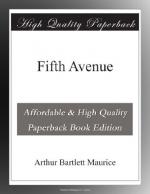But so far as the great world beyond the Weehawken Hills went, Ward McAllister’s was an ephemeral glory. It was a clear case of anachronism. He was born one hundred years too late, or two hundred years, or two thousand. His was the soul of the Roman Petronius, or of one of the Corinthian eccentrics, who strutted in St. James’s Park or past Carlton House in the early days of the Regency, and gave colour to that otherwise grim England that was grappling for life with the Corsican; or of “King” Nash of Bath. It was the “King,” perhaps, that he suggested most of all. But in the Carlton House circle he might have out-Brummelled Brummel, and supplanted that famous Beau as the object of the fat Prince’s attentions and ingratitude. Indeed there was a flavour of Brummel’s biting insolence in some of the sayings that were attributed to the New Yorker. For example, there was a well-known literary woman of New York, who had in some way incurred the arbiter’s august disapproval.
“She write stories of New York society!” he said. “Why, I have seen her myself, buying her Madeira at Park & Tilford’s in a demijohn.”
When Thackeray was contemplating writing “The Virginians,” he desired information about the personality of Washington, and applied to the American historian Kennedy. Kennedy began to impart his knowledge in the manner that might have been expected from a historian when the Englishman interrupted rather testily, “No, no. That’s not what I want. Tell me, was he a fussy old gentleman in a wig, who spilled snuff down the front of his coat?” It was in some such spirit that I applied to that old friend of the fine Italian manner, and the profound personal and inherited knowledge of the ways and the men and women of New York. I did not, I explained, wish to be unkind, but the memory of that latter-day Petronius was one of the most mirth-provoking memories of my boyhood. Was he fair game for a chapter of a flippant nature? But why not? was the retort. He himself would have adored it.
Fame came to him through the newspaper reporter. It was a smaller New York, a more limited Fifth Avenue in those days, and Mrs. Astor ruled its society without any one to question her sovereignty. She was about to give a great ball, and Ward McAllister, as the self-appointed and generally accepted secretary of society, was in charge of the list of invitations.
To the reporter sent to interview him Mr. McAllister explained that, owing to problems of space, only four hundred cards were to be sent out, commenting: “After all, there are only four hundred persons in New York who count in a social way.”
“And who are those four hundred persons?” asked the quick-witted reporter.
On that point Mr. McAllister was more reticent. But the reporter obtained the list of those who were to be invited to the ball, and the names were printed as those who constituted New York’s “Four Hundred.”




